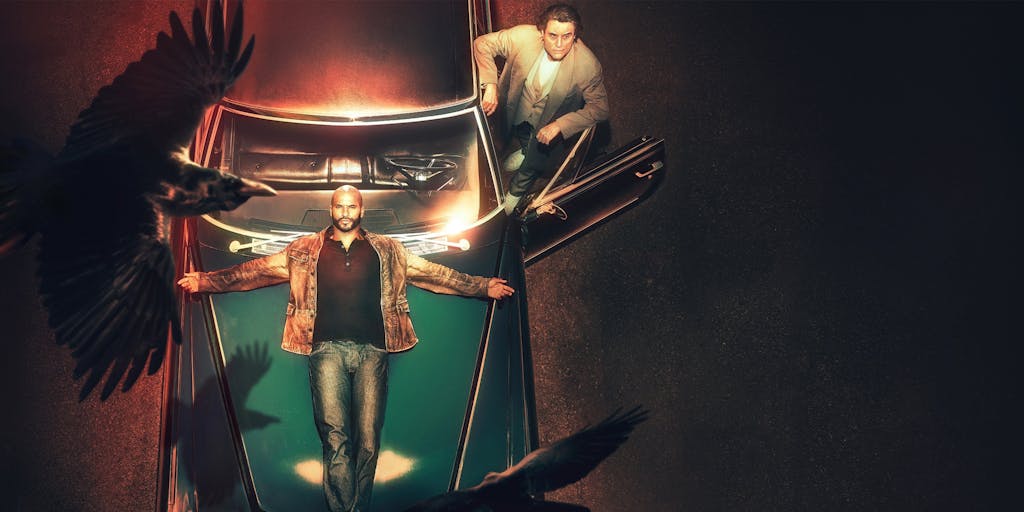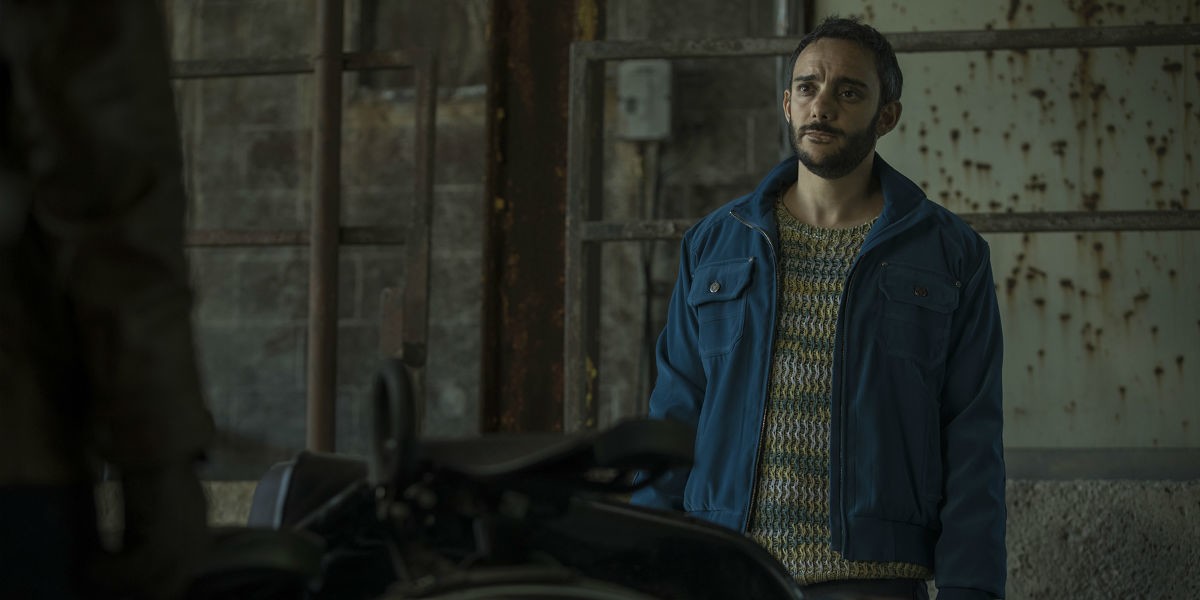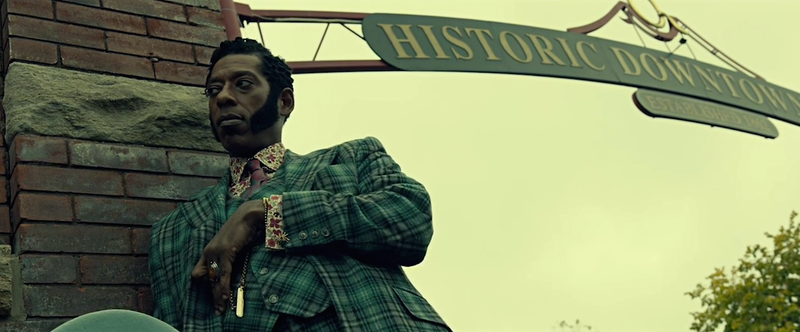
I just want to add this recap of this episode here by StoryDrive. He covers most of what I’m going to talk about, as I elaborate on his video because we’ve got to cover some stuff. This particular episode was very deep, very intense, and speaks directly to a part of my cultural past as a descendant of the South. I was uncomfortable with a lot of the imagery here, but not because its being addressed, but because I’m supposed to be uncomfortable. You’re not meant to watch this and feel okay about it.
As I mentioned in a previous post, my family is from Mississippi, and one of the reason we became part of The Great Northern Migration (goodness! it sounds like a flock of birds, although its probably something more akin to fleeing a forest fire), is my grandmother’s terror that her sons would never reach adulthood there. Mississippi had one of the highest rates of lynching after the Civil War, leading up to the Civil Rights Era. So, the specter of lynching is behind a lot of the Black families that live in the Northern US. If you didn’t move here for fear of your own, than you probably have a relative who was. This episode isn’t so much about the ways of the dead, but speaking with the dead. what do the dead want. This question is answered in the character of Will “Froggie” James.
https://www.naacp.org/history-of-lynchings/
Mississippi had the highest lynchings from 1882-1968 with 581. Georgia was second with 531, and Texas was third with 493. 79% of lynching happened in the South.
We are halfway through the season and meandering our way to some sort of conclusion. There are things Wednesday needs to do to bring about his War of Ascension, which is what all of this activity is leading to, and there are constant references to Shadow, and his eventual fate, which you know, if you’ve read the book this show is based on. While Wednesday is running around collecting his artifacts, some of the other gods are also in the maneuvering stages, trying to convince other gods to join them in the war, or distancing themselves from the war effort.
But first we need to briefly go over what happened in the last couple of episodes. We’re at the stage in the book where Shadow is working with Bast and Ibis at the funeral home, after he escaped from the train car where he’d been held captive by one of Mr. World’s flunkies, The Beguiling Man. After Laura rescues him, he leaves her after witnessing her brutally kill a man. He gets picked up, on the side of the road, and driven to Cairo, by Sam Black Crow, a Native American woman who claims to be Two Spirit, with a tattoo of Coyote (The Trickster) on her shoulder.

Two-Spirit (also two spirit or, occasionally, twospirited) is a modern, pan-Indian, umbrella term used by some indigenous North Americans to describe certain people in their communities who fulfill a traditional third-gender (or other gender-variant) ceremonial role in their cultures.[1][2][3] While most people mistakenly associate the term with “LGBT Native”, the term and identity of two-spirit “does not make sense” unless it is contextualized within a Native American or First Nations framework and traditional cultural understanding
So, while Sam is not a god, or even demi-god, she does hold some spiritual status, and we’ll be seeing more of her later. When she lets Shadow out of the car at the funeral home, he is surrounded by fireflies, and she asks if they are friends of his. That’s significant because fireflies, in Japanese folklore, and probably some Native folklore, represent the souls of the dead. They also represent “light in the darkness”, which is what Shadow Moon looks like to Laura. The fireflies also look like burning embers, floating on the wind, an image that is repeated when Shadow has a flashback to the local lynching, where Willie James is burned alive.
Here, I.09 talks about the use of the lynching imagery in this episode, and despite that I did like the episode, I do agree with the article. I’m not sure what I was supposed to get out of those images, or why the audience had to be traumatized to tell it. I do get why they keep mentioning the subject though, because its a direct reference to Shadow’s horrible fate. For those who haven’t read the book, its just jarring and confusing. I don’t think we need more imagery of Black brutality to get the message.
https://io9.gizmodo.com/american-gods-has-a-lynching-problem-1833849755
“The Ways of the Dead” spends a great deal of time following Shadow as he figures out that Will James’ death inflicted a curse on Cairo that’s responsible for the town’s decades-long history of brutalizing and murdering black people—a kind of supernatural scar borne out of the terror and pain he felt in his dying moments.
In The Ways of the Dead, we go back into some of the history of the city of Cairo, (pronounced Kay-Ro), while Laura and Sweeney visit New Orleans, so she can appeal for a resurrection ritual by Baron Samedi, and Maman Brigette, while Wednesday, Salim, and the Jinn visit the King of the Dwarves, so he can sharpen Wednesday’s spear, Gungnir.
There are already a lot of people discussing the lynching imagery in the episode, so I won’t discuss that, but I do want to talk about all the mythology referenced in the episode. So far this season, we’ve met a number of Black and African gods, and some of my readers may not know much about them. There’s also a wealth of Norse mythology referenced as well that has a direct bearing on Wednesday’s ultimate goal in having this war.
Gungnir: https://norse-mythology.org/gungnir/
In the war between the two tribes of gods, Odin led the Aesir gods into battle against the Vanir. He began the battle by hurling his spear over the enemy host and crying, “Óðinn á yðr alla!” (“Odin owns all of you!”). The historical Norse repeated this paradigmatic gesture, giving the opposing army as a gift to Odin in hopes that the god would return the favor by granting them victory.[7]
You see how this works? Odin is re-staging the battle between the Aesir and the Vanir, of Norse mythology, and probably means to sacrifice the opposing team to himself in order to gain power. For this to happen, as in the book, he has to die before the war, but hopes to be resurrected in Shadow, after Shadow dies during the Vigil he has agreed to have for Wednesday. Its part of the Compact Shadow made with him, and the ghost of the lynched man, Willie, tells Shadow as much when he haunts and possesses Shadow in this episode. The name of the Spear means The Swaying One, which is a reference to one of Odin’s other names he got for sacrificing himself on, Yggdrasil, the Tree of Knowledge.
Now throughout the season, and even in this episode, we’ve heard Wednesday be referred to by many names, and he does indeed have a lot of them, more than a hundred. Wand Bearer, Spear Shaker, Gallows’ Burden, The One Who Rides Forth, Spear Charger, Spear Master, The Hanged One, God of Prisoners, God of Runes, Dangler, and Swinger, are all names that have some reference to Odin’s backstory, Shadow’s fate, or the coming battle.
In an earlier episode, we saw Odin receive a sprig of leaf from one of the Indigenous gods, named Whiskey Jack. Odin planted that sprig, and peed on it. The next time we see the sprig, it has grown to the size of a bush, in only a couple of days. It’s believed that Wednesday is growing a new Yggdrasil, so that he can fashion a haft for the spear, from the wood of the tree. He may also be preparing this tree for Shadow’s eventual Vigil on it. In the meantime, Wednesday needs to have the Runes, re-carved into the Spear, as they have faded over time, and needs to find the Dwarf, Duvalin, who was responsible for carving them the first time. Needless to say, absolutely none of this is in the book, exactly. It’s implied by who Wednesday is, his backstory, (which is featured in the “Prose Edda”), and what happens at the end of the book.
Now let’s talk about the rest of the gods seen and mentioned in the show. Earlier, Bilquis, Nancy, and Ibis got together and yep! I called it! Bilquis and Nancy had an intimate relationship in the past. They argue for a bit, with Nancy trying to convince the other two to join in the war, but they’re not having it. Seeing these three gods interacting is one of the more fun aspects of this season, as none of these beings meet each other in the book. I talked about these three gods last season, but we meet some new gods never mentioned in the books.

Well, technically the “gods’ in Voodoun are not actually gods. What we’re seeing in the show are aspects of Louisiana Voodoun, rather than the Haitian version which is called Voodou. They’re major spirits (or presences) that fall under the aegis of a kind of Death Spirit named Guede Nibo. Baron Samedi is one of the Guede loa, who are very powerful spirits of death and fertility.
https://blood-and-bourbon.obsidianportal.com/wiki_pages/the-loa
They are also referred to as Mystères and the Invisibles and are intermediaries between Bondye—the Supreme Creator, who is distant from the world—and humanity. Unlike saints or angels however, they are not simply prayed to, they are served. They are each distinct beings with their own personal likes and dislikes, distinct sacred rhythms, songs, dances, ritual symbols, and special modes of service. Contrary to popular belief, the loa are not deities in and of themselves; they are intermediaries for, and dependent on, a distant Bondye.
Maman Brigitte (English: Mother Brigitte) also written Gran Brigitte, Grann Brigitte, Manman, Manman Brigit, and Maman Brijit, is a death loa and the consort of Baron Samedi in Haitian Vodou. She drinks rum infused with hot peppers and is symbolized by a black rooster. Like Samedi and the Ghede, she is foul-mouthed.[1] She is also the adoptive mother of Ghede Nibo.
Referenced, but also not referenced, is Guede Nibo who is the spirit of the first murdered person. Although Nibo is not in the show, he is represented by Willie, the lynching victim, as Guede Nibo is the Patron of murder victims, or those killed by unnatural means. Since Willie’s final resting place is unknown, and his body unrecoverable, (his death cursed the town of Cairo), he falls under the power of Guede Nibo. When Shadow is possessed by Wilie’s spirit, and speaks in his voice, this is also a manifestation of Guede Nibo who, when he rides his horse (aka his host), often speaks through them in the same manner. Guede Souffrant, and Samedi are also representative of Willie, as he wasn’t just murdered, he was burned and decapitated.

Having Shadow be possessed by the spirit of a murdered man may have been the writers attempt to tie Shadow’s part of the episode to Sweeney’s and Laura’s meeting with the other loas, but if so, it was a very clumsy attempt, and would have worked better if the writers had been a little more clear about their intentions. As it stands, the viewer is left to wonder what this connection is to the other characters. For viewers who don’t have a head full of useless trivia and horror novels, (like me), or don’t know to look up these types of questions, then the two lines of story appear unrelated, and they were subjected to the visual trauma of Willie’s story for no reason.
Baron Samedi is accompanied, in this episode. by his wife Maman Brigitte, who is also a death loa, in charge of crosses, and tombstones. She is a often associated with the Celtic goddess, Brigid, or Brigid of Ireland, which is how we get the connection to Mad Sweeney. If both of them were once members of the Tuatha de Dannan, before they were brought to America, this is how he would have known of her. The two loas are asked to perform rituals to make Laura alive again, so that she can give back Sweeney’s coin. Laura is given a potion to drink that will make her alive again, but she refuses to drink it. (I suspect we need to make note of that.) When Sweeney has a chance to get his lucky coin back, he backs away again, because as much as he hates to admit it, he is in love with Laura, and taking back his coin would kill her, since she doesn’t drink the potion given to her by Baron Samedi.
We have an interlude with Salim and the Jinn as the two of them argue about faith. In the Jinn’s backstory is his rejection of Allah, and Islam, and he wonders how Salim can square his faith in Allah, with the existence of other gods. When Salim, the Jinn, and Wednesday visit the King of the Dwarves, he mistakes Salim for an entity named Manat, who is an ancient Arabic goddess, whose worship is all but extinct, as her last temple was destroyed centuries ago.

I love what the writers are doing with the relationship between Salim and the Jinn, actually. They are together, there is a strong connection between them, and Salim is ready to wholeheartedly throw himself into a relationship with this being, but the Jinn is reluctant to have a relationship with a mortal, especially one who practices a religion he rejects, and despises.
So, although the flavor of the season is quite different than the last, I’m liking this one a lot, because the interactions between all these different characters, that do not happen at all in the book, btw, are a helluva lot more fun. I’m enjoying their conversations, which appear to be part of a larger conversation about a god’s responsibility to its human followers, left over from the first season. The show seems to work best when the gods speak for themselves, among themselves.

I’m also glad that Shadow has been given something to do besides look angry or confused. When he is possessed by Willie is when Whittle does some of the best acting he’s done all season, but only because its the most acting he’s done all season. Since his revelation that gods are real, and Wednesday is actually Odin, he’s gone back to being a passive participant in these events, and this episode gives him something to do besides simply reacting. Its also probably a good idea that he is spending a little less time with Wednesday, and meeting some of the other gods.
I can see why they are branching away from the book. There’s a long middle section which Shadow spends mostly alone, hiding out from Mr. World, before the battle, at the funeral home with Ibis, and in some podunk town, where children have gone missing every few years, and hopefully we wont reach that stage of the book, or it will be shown is a very different way. I thought it was an interesting interlude because I liked Shadow, and the book is well written, but it doesn’t make for interesting viewing, so the writers creating new interactions is needed.
Overall, I actually enjoyed this episode, despite the lynching imagery, which I didn’t closely watch, anyway. I don’t often watch the show as it airs. Once I realized what they were showing, I sort of fast forwarded through that section of the show. I got the idea. (I would ask that that director probably not be allowed to do anymore episodes, though.)
